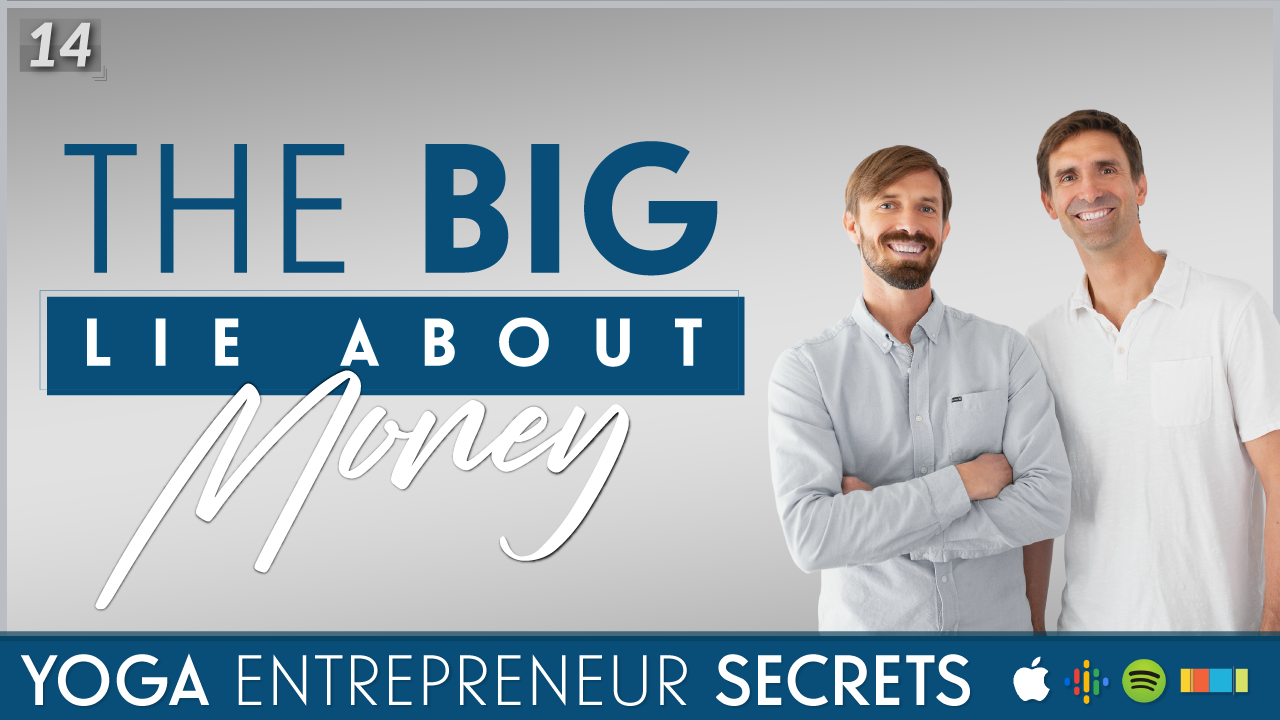14: The Big Lie About Money

What Is This Episode About…
In this episode, we are going to discuss the fact that money is really just energy and a medium of exchange. This is a sticky topic, especially in the yoga world, but it’s super important and why we have spent the past few episodes highlighting our battle with money so you can avoid our pitfalls and learn what we have over the years.
We’ll debunk the idea that Time is Money while giving reference to Myron Golden, and also discuss how the misunderstanding of what value is and how to create more of it, is keeping yoga entrepreneurs from making more money.
If you’re an existing or aspiring yoga entrepreneur, you won’t wanna miss this one. Check out the episode above or on your favorite podcast player here.
Key Points Discussed:
- The mud of our lives is what gives rise to the beautiful expression of who we are (01:21)
- The money beliefs that control us (02:59)
- Freeple, cheaple, and feeple (05:05)
- It’s never an equal exchange of value (09:11)
- The money is more valuable than the service (11:59)
- Money is not equal to time, but it can help you get some of your time back (14:35)
Learn More About The Content Discussed…
Join The Facebook Group –> http://bit.ly/yogaentrepreneur
When Was It Released…
This episode was released September 25, 2019
Episode Transcript…
Disclaimer: The Transcript Is Auto-Generated And May Contain Spelling And Grammar Errors
00:00 Right. So, today we want to talk about the sticky topic of money. Yeah, we’ve been on this kind of money kick last couple episodes. We’re gonna continue, and talk about what it is, and what it is not.
00:15 What’s up everyone? You are listening to Yoga Entrepreneur Secrets. I am Chris Yax, and I’m John Yax. We are part of a small group of yoga entrepreneurs who are committed to making a living, doing what we love, without feeling guilty about making money, or ashamed of being successful, because we know the real value of yoga and how the world needs it now more than ever. This podcast is here to teach the strategies and tactics so we can thrive financially as yoga entrepreneurs. We are the Yax brothers and welcome to Yoga Entrepreneur Secrets.
00:46 Yeah. So, Chris. We… you and I have kind of broken-down our money issues. Exposed… So painful, so painful.
00:57 So we talk about our money issues and like what… how that’s affected our lives, and what’s also… it’s one of those things too, which is interesting cause it’s… it’s affected us, but it’s also created a drive in us. You know? It’s like… but it’s taken… it’s gotten to a certain point, and we’ve expanded to the point that we’ve decided, “Okay, I need to be proactive, and actually do something about these money issues because I cannot live with myself.”
01:21 Yeah, it’s funny cause the… it’s one of those things where the… your greatest weakness is also your greatest strength. And like, the issues that we’ve had… it’s funny cause, this is… in yoga, we talk about like, the symbolism of the lotus flower, and like the mud of your life. So, the symbolism… if you’re not… if you don’t know about like, the whole yoga speak, is the lotus flower is a very prominent symbol in yoga, because, it grows from the mud. Right? And this beautiful expression of a flower, this gorgeous flower, comes from mud, literally, something that like stinks, is a little disgusting, doesn’t feel good, doesn’t look good. Right? But, this beautiful thing grows from it. And so the symbolism is that our lives… the mud of our lives, is what gives rise, gives birth to, this beautiful expression of who we are. And so, it happened with us, with our dad, and the resentment, which gave birth to this ability to forgive, and this huge lesson in our lives, that we were able to overcome. And, the same thing with money, like the issues that surrounded our lives, the circumstances of our lives, the mud that I would look back and be like, “Oh my God, I wish we were rich when I was growing up. It’d be so much easier.” No, it probably wouldn’t. We’d just have different problems. So, the value of growing up in the… the scarcity mindset that we had, was that it gave us the opportunity to learn more about money, to overcome those issues, and to be better for it.
02:43 Yeah. Think about the ideas, the beliefs, that we all have around money. We all do. The idea that rich people are greedy, or the idea that money is the root of all evil. Right? Or, this is like common ideas, or money can’t buy happiness, and…
02:59 Well, broke can’t buy anything. Nope! It can’t buy anything. Cardone said that actually. Or, money can’t fix all your problems. Beautiful, teacher of ours, Myron Golden said, “Yeah, money can’t solve all your problems, but it can solve 95% of them.” Then he was like… and then he goes on to say, ”And then once you’ve solved 95% of them, you have plenty of time to figure out the other 5% that money can’t solve.” It was so good. So good. But one of the… another big thing is like, that we get caught up in is, the higher education, like the more we educate ourselves, the more we make? It’s another belief pattern and it’s… there are a ton of examples that show that that’s not always the case. Yeah. If you want to work for somebody, or be self-employed, you can get higher education, and then do that, and you can make a decent income, but think about like the pioneers, like the… the people that are like the ultra-entrepreneurs, like Edison, Thomas Edison, or Ford, Henry Ford, Steve Jobs, Bill Gates, Michael Dell. Like, all of those people dropped out of high school, either college, either one. High school or college. Everyone of them did, yeah, every one of them dropped out, and, went on to be just massive influences in the world, as entrepreneurs. So… so it’s interesting because we all had these… these beliefs, and a lot of times, they are false beliefs based off what our family taught us, or society taught us, they are these… these ideas, but the crazy thing is, they control us, right?
04:28 Yeah, they do. And that same mentor of ours, Myron Golden, he wrote that or he wrote, he actually said it on stage because we just got back from, at this point when you listen to this, I’ll probably be like three weeks, but it was this event called OfferMind, which was awesome. They call it the stuff that we’re learning about for our business and how to scale it, all that stuff. It was like all condensed into this awesome two-day event. And he was one of the speakers and what he said was, we don’t attract what we want. We attract what we are and this is why we’ve been on this kick of like money and our beliefs around it and our histories and all the issues around it is because you may think that you want money, but what you’re attracting is what you are.
05:05 And if your money, if you’re, your mindset is scarce, you’re attracting scarcity, right? If you’re, oh he also talked about like different classifications of people and like there’s freepo people who only want free things and cheapo people who only want cheap things and feepo people who are willing to pay a fee for the service. And there are prepo people who are willing to pay a premium and wherever you fall in that classification is the people that you’re attracting. So if you’re wondering why everyone you talked to wants your services, your products for free, look at yourself. And I’m like, and it’s funny because John and I just, I was a free pool. Cheapo for most of my life. I’m always looking at like, okay like how can I get the best discount? I know if I talk to that person cause like I know them, they’re a friend, they’re the owner.
05:49 They’re going to hook me up with a discount. Now I’m like, no, no more of that. I want, don’t give me a discount. I want to pray the premium that you have to offer me because I know that’s who I want in my atmosphere, in my ecosystem, in the people that I want to serve, or the people who are willing to pay a premium. It’s a universal law. People, what you put out is what you get, right? What you sow is what you read works every time. Yep. Okay, so let’s get into it. That was kind of like the precursor of what we want to talk about. And so the question today, John, is what is money, right? Yes. Like what is money? This is a really good question because we all have ideas about not just beliefs around money, but an idea of what money is, what money actually represents.
06:33 And so what we teach and what we’ve taught in our teacher training is that money is an energy. It’s energy, literally like energy. You put effort into something and for that effort you are reciprocated something. Now money as far as the paper itself is just the medium of exchange for that energy exchange. That’s it. It’s so simple. Yeah. And so what we do for somebody, if you’ve take it back far enough, you go back to like, so I’m going to help you build your barn and sounds good in exchange for that. You’re going to give me a Bushel of corn. But let’s say it’s, we build your barn at a time of year where your corn is not ready. So what do we do then? Right? You’ve got to give me a note that says here’s a note worth a Bushel of corn. But then I don’t, maybe I reap my garden and I don’t need corn right now, but I do need a sheep, right?
07:25 So I go to my neighbor and like, hey, I need a sheep and I heard that you need some corn. So here’s the note for Chris’s corn and I’ll take that in exchange for your sheep. And this is how the this nominee started. We used to be just an exchange. So when Chris says it’s an exchange of energy, literally is an exchange of energy, right? I did something for you and you gave me a note that represents that energy exchange so that I can go to somebody else and say, here, this is what this is, that energy exchange that I can get something else. Right? Yeah. So if it’s energy, it’s time and effort. You’ve put your time and effort into something of which is valuable enough for somebody to give you something in exchange for that. So my next question to you Chris, is it an equal exchange? Never. Now this blew my mind. So if you think about it like John just used the, we’ll just ride the corn first, build a barn like analogy 200 years ago.
08:22 Now that I think about it, we will stop that analogy and fast forward 200 years to present day, someone comes into your yoga studio and they say, I would like to pay you this hundred dollars for the two weeks of unlimited yoga. Okay, sounds good. You would think in your mind that as far as the value is concerned, the two are equal. It’s not. I always thought they were equal. I’m like, okay the, it’s an equal exchange. They are getting two weeks of unlimited yoga. I am getting $100 that’s the equal exchange and it’s not true. Is it John? No, it’s not. One of the, this was, this blew our minds. A friend of ours, Brad Gibb showed this on stage when we went to conference call funnel hacking live and he showed this on stage and we were like, but we’re going to brat on by the way.
09:12 Yeah, he’s coming on. Woo. Really excited. But so he showed us this as this exchange of like, so what happens where when I give you all, she used the same example, I’ll give you $100 Chris for a week of two weeks of yoga. I value that. Two weeks of yoga more than that $100 and I value that $100 more than the two weeks of yoga. It’s never an equal exchange because the value that I place on what I’m giving you is less than what I’m getting. This is so important to understand because if you look at it as an equal exchange, you’re going to be minimizing the value of the service or product that you’re offering the person your yoga. And this is what you see all over the places. Like every studio is just like at this, literally this like price war of race to the bottom of the barrel to see who can charge the least.
10:05 And perceptually what happens is people are like, oh, so you want like $30 for an entire month? Okay, yeah, I’ll do that. But you know, the value of what you’re offering is more than that and you’re minimizing it and they’re like, yeah, absolutely. And in their mind it’s not as valuable because they know man, 30 days for $30 of yoga that is a re it’s a great deal. But the value has been minimized to a point where they don’t really value it. And guess what happens when they finish that 30 days and you go to them and say, hey, would you like to actually practice consistently with us? Here’s a premium membership for a $130 what do you think the, how do you think they see it now? No thank you. What? I just paid $30 for a month. Now you want me to pay a hundred $130 for $130 per month?
10:57 No Way. Right? All the guys, it’s all value. It’s all value, right? If we initially do a, it’s called lb low barrier to entry offer, we have already set up like the pacing of the value of what our services is worth. And so when people finish that and they look at, okay, now I’m ready to jump in. And they see that it’s what, four times as much as they just paid for a month. It’s a hard pill for them to swallow. Yeah, and almost impossible. So if you’re a yoga studio and you’re like, man, why are my conversions from my introductory offer to my membership so low? Look at what people are paying for the introductory offer and then start now understanding this money value equation that’s not equal, you’ll start seeing like, man, the value that I’m placing on that introductory offer is so low that they’re not seeing the value of it because obviously we’re saying it’s not equal, but you, what we’ve done is we’ve distorted that equation so much so that perceptually they’re paying such a low rate that they don’t value it at all.
11:59 And so it’s so, so important. So money is an exchange. The exchange is never equal. And it’s our job to understand what our value is to then express it to the lead or whoever that is coming into your doors, that you want to be a part of your tribe, a part of your community, and hold the value to a point and place in a value on that service that they see it and they’re willing to pay for it because they’re coming in to solve a problem. Right? And that problem for them is valuable to be solved. And if you know you can do it and you charge enough for all the sudden, man, them getting that problem solved is worth way more than the money they’re giving you and you knowing that the money that you need to keep the doors open, to pay your teachers to keep the lights on and keep the heat rolling, to keep everything that you need going to keep offering that service is that money is way more important than way more valuable than the actual service you’re providing.
12:53 I know I can hear if like your yoga is and you’re like, wait a second, that’s more valuable. The money is more valuable than the service. Yes. In the exchange because of what it provides for your studio and for the community. So another topic that we want to touch on around money is time, right? And so there’s this idea that, and you hear all the time at time equals what? Money. Time equals money. Money is time. Time is money. Chris, does time equal money? No, it doesn’t. It does not equal money. It’s not even close. Time is infinitely more valuable than money. Y. Here’s an example. Again, this is from the great mentor himself, Myron Golden, so we’re at [inaudible] and he said, all right, listen, here’s the deal. You’ve all heard, money is time. Time is money. Yes. And he was like, all right, let me prove to you that it is not.
13:40 He said right now if I were to give you $100,000 what’d you say? Yes. If so, say yes, yes. And he said, okay, here’s the contingency, the condition that is, here’s the condition on me giving you that $100,000 when I give it to you immediately you’re going to die. Would you still take the a hundred thousand dollars no, thank you. Why? Because I just took time. The rest of your life away from you just like that. Now time does not equal money because it’s more valuable than money because you would give anything to have more time with the people that you love doing what you love, period. Now what’s cool is that money can buy your time back when you’re able to make enough of it that it frees you from the mental constraint of like wondering how am I going to keep the doors open? How am I going to pay my teachers?
14:35 How am I going to make payroll? How am I going to put the lights on? How am I going to buy supplies? How am I going to, like all of the small business owner struggles and stresses that we go through, like when money is constraint is a constraint for you that way, like lose time because you’re always thinking about how am I going to make it? How’s this going to work? Right? And so what money can do now, it’s not equal to time, but what money can do is help you get part of your time back so that you can be free to work on the business, not in the business. And doing that frees you up to pull the levers in your business that actually can make you more money and then free up your time even more. So what Chris is saying simply is that we can get money back.
15:20 We cannot get time back. Right? Time is… Once the time is gone, it is gone. It is done. And with the… they have conversations with people that are all at the very end of their life, and you never hear them say, ”I wish I had more money.” Right? They always wish they had a little bit more time with their loved ones. And, so that’s what it comes down to you guys is, we need to, create a life that’s on purpose, create a life that, we have the time to do what we want to do, when we want to do it, with who we want to do it with. And that’s why it’s important to learn, to understand, to implement, and to take massive action. Yeah. So, thank you so much for listening to this episode. We hope there were some… little gold nuggets in there to help you in your journey. We appreciate you. Peace.
16:03 Yes. thanks so much for listening to Yoga Entrepreneur Secrets. Do you have a question that you’d like us to answer raw and uncut on the podcast? If you want your questions answered, all you need to do is head over to Apple Podcasts, and do three simple things. One; rate and review telling us what you think of the podcast. Two; in that review, ask anything you want related to yoga, and three; if you want to shout out, leave your Instagram handle or name and that’s it. Then listen in to hear your question answered Live, raw and uncut. Join us next time on Yoga Entrepreneur Secrets Podcast. Thanks
Comments are closed.


